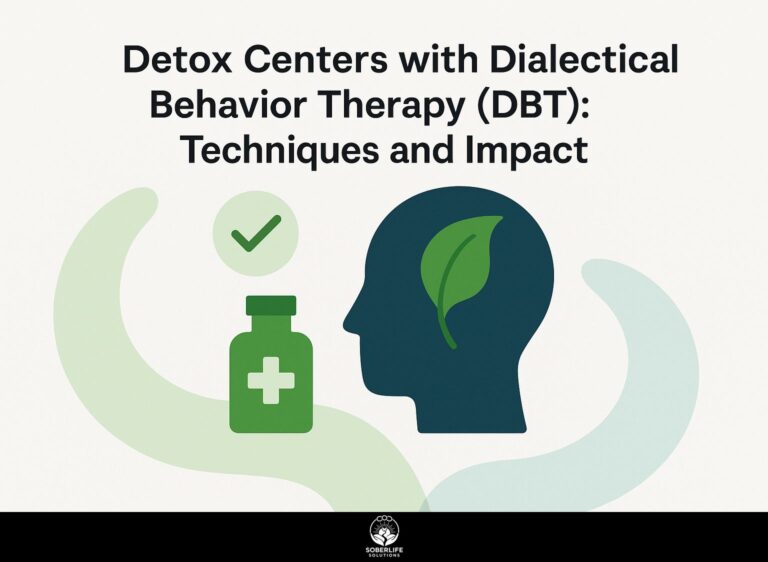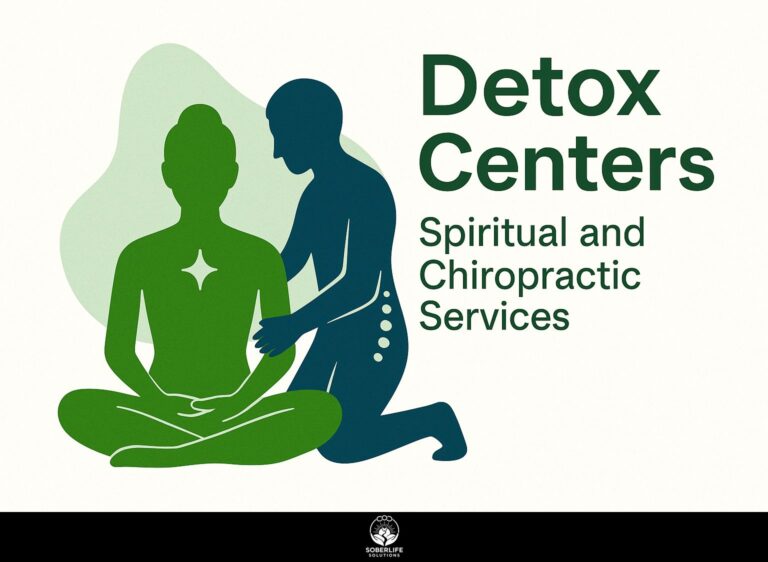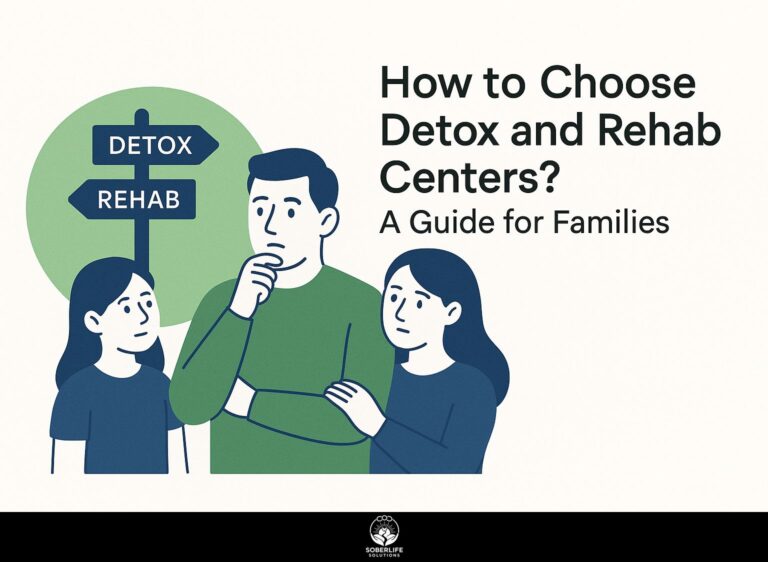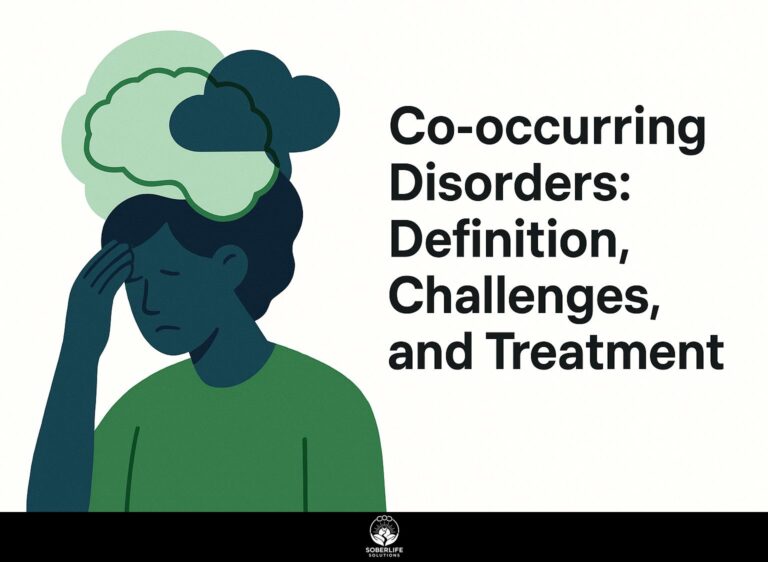Detox Center Management: Case and Medication Processes, Services, and Impact
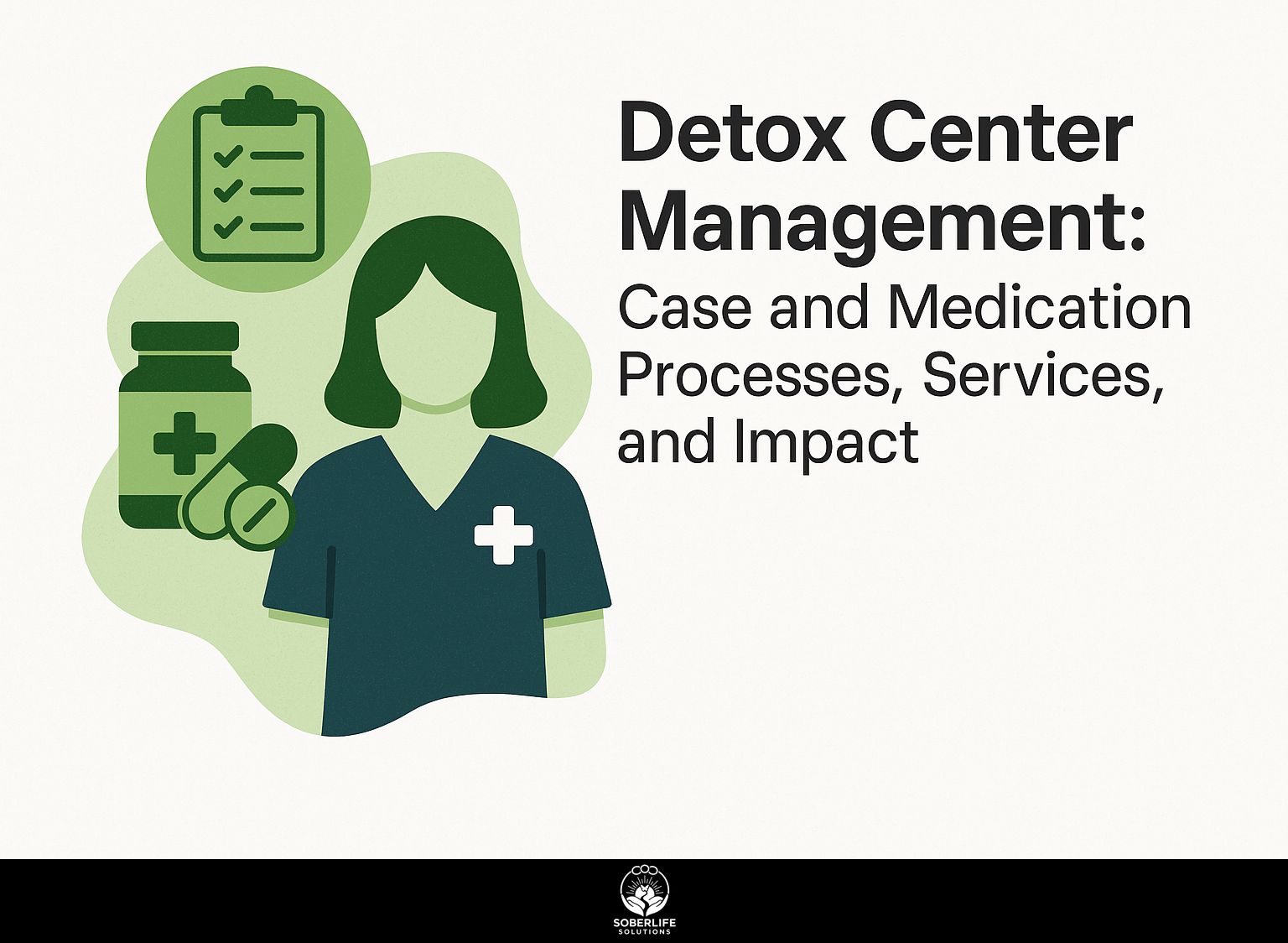
Managing a detox center is important for successful addiction treatment, especially when resources are temporarily unavailable or restricted. The Robert Alexander Center provides useful information on patient treatment and medication methods, which you can find on the NCBI website. This article covers the key services and effective approaches in detox management, providing you with information to help individuals who want to recover.
Key Takeaways:
Overview of Detoxification
Detoxification is the medical procedure where substances are removed from the body, usually lasting 5-10 days based on the type of substance and how serious the addiction is.
During detox, individuals may experience withdrawal symptoms such as anxiety, nausea, and tremors. It’s important to go through this process with a doctor, as they can provide medicines and support to reduce discomfort.
For example, benzodiazepines can manage anxiety, while clonidine may reduce withdrawal symptoms associated with opioids. Studies show that detox programs overseen by medical professionals, such as those described by the Tennessee Department of Mental Health and Substance Abuse Services in their medically managed inpatient detox guidelines, have a 90% success rate in safely handling withdrawal. This highlights the need for expert help during detox, aligning with the comprehensive stages outlined in our guide to detoxification.
Importance of Management in Detox Centers
Management in detox centers makes work run smoothly by using organized methods, which improve support for patients and how resources are used.
Effective management practices involve coordinating care among multidisciplinary teams, assessing individual patient needs, and maintaining clear communication with administrative staff.
For instance, regularly scheduled meetings can facilitate care coordination, allowing staff to track patient progress and adjust treatment plans as necessary.
Utilizing data analytics tools can help assess patient outcomes, tracking metrics such as relapse rates and readmission statistics. According to the Agency for Healthcare Research and Quality, effective care coordination is crucial for improving patient outcomes and resource use.
By using these methods, detox centers can run more smoothly and also make patients happier and more likely to recover successfully.
Case Management Processes
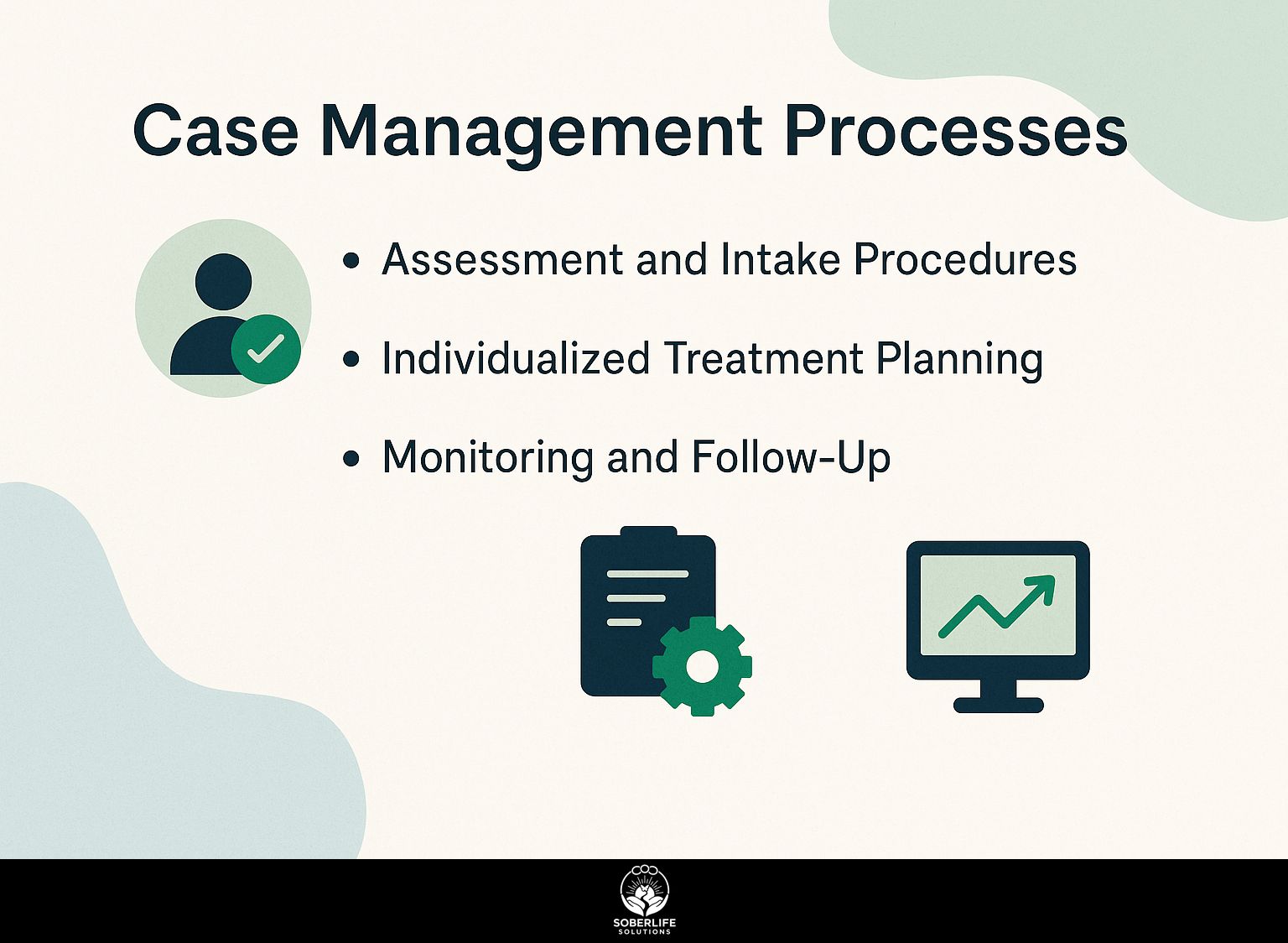
Case management processes are important for providing customized addiction treatment based on each patient’s individual needs. Worth exploring: Behavioral Therapy for AUD: Approaches, Types, and Benefits to understand how different therapeutic approaches can support these customized treatment plans.
Assessment and Intake Procedures
Assessment and initial procedures usually require 1-2 hours. They involve detailed evaluations using standard forms such as the ASAM Criteria.
- The first step involves an initial screening, often utilizing tools like the CAGE questionnaire to identify potential substance use issues quickly, as highlighted in the Screening and Assessment Tools Chart by SAMHSA.
- After that, a full health check takes place, looking at both physical and mental health using customized intake forms. During this phase, it’s important to focus on gathering thorough patient histories.
Common mistakes include not gathering enough data and ignoring mental health aspects. To avoid these, provide thorough training for staff on the importance of asking questions and listening carefully during interviews.
Individualized Treatment Planning
Individualized treatment plans should be created within 24-48 hours post-intake, involving input from a multidisciplinary team of professionals.
This team usually includes therapists, medical staff, and possibly dietitians, each sharing knowledge based on their skills.
Begin by determining specific, measurable goals, such as reducing anxiety symptoms by 30% within six months.
Use tools like CareSmart to monitor and document progress, adjusting plans when needed.
Holding a team meeting every month helps everyone stay informed about new requirements.
Encouraging family involvement can also provide additional support, enhancing the overall effectiveness of the treatment plan.
Monitoring and Follow-Up
Weekly visits to patients are important to check their progress and change their treatment plan if needed.
Using tools like SimplePractice can make it easier for healthcare providers to record notes and manage follow-up tasks effectively.
Checklists are essential; they should include items like:
- Reviewing medication adherence
- Assessing mental well-being
- Confirming attendance at therapy sessions
Family participation is important. Try organizing monthly family meetings to talk about progress together.
This combined method gets support and improves accountability, allowing treatment plans to be changed immediately.
Medication Management
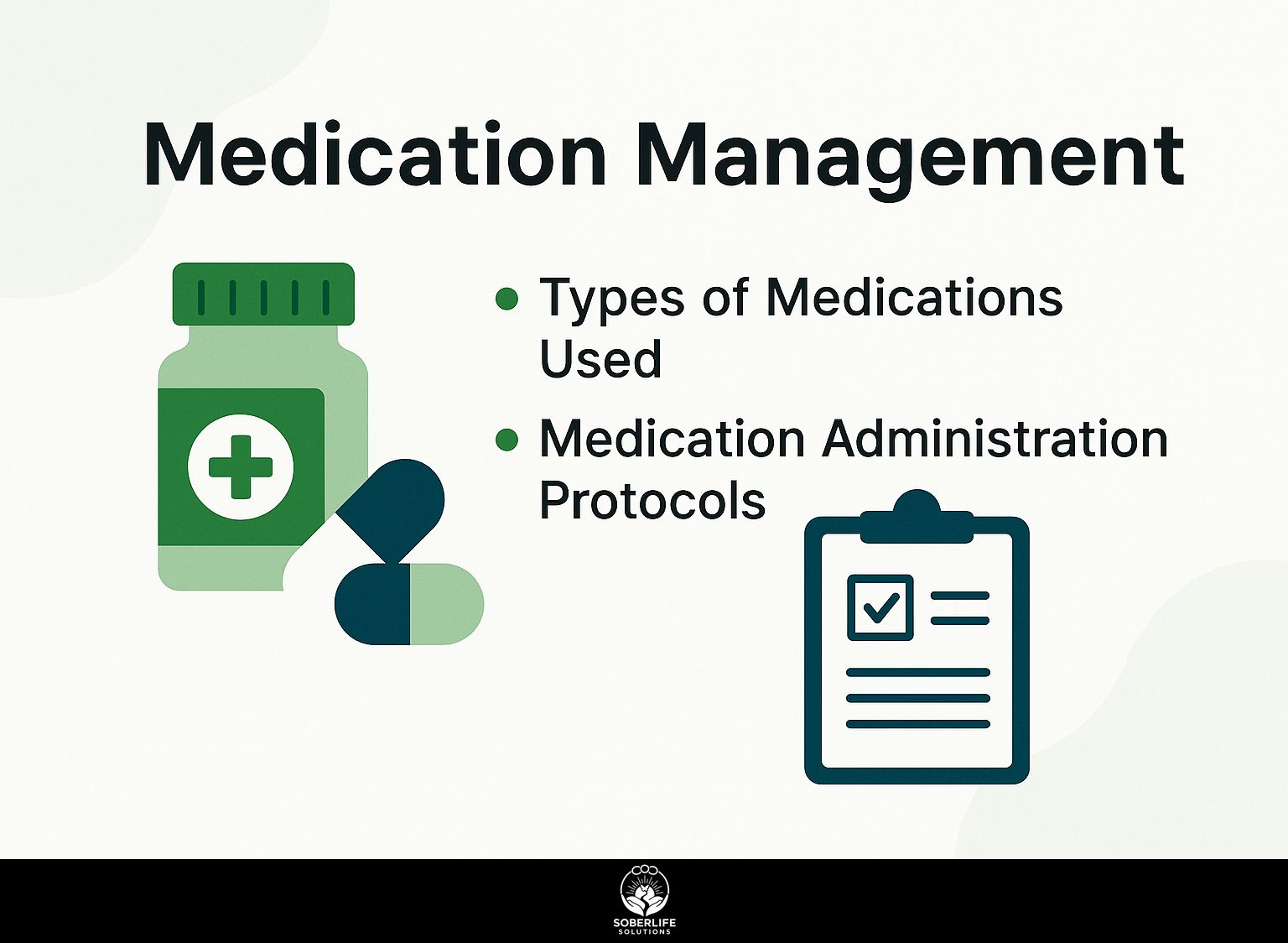
Managing medication effectively means using different drugs to reduce withdrawal symptoms, following guidelines focused on patient safety and compliance. For those interested in the broader context of medication management during recovery, exploring the various types of detox services and their outcomes can provide valuable insights.
Types of Medications Used
Commonly used medications during detox include:
- Methadone for opioid withdrawal
- Clonidine for anxiety
- Benzodiazepines for seizure prevention
Methadone, for instance, is effective in reducing cravings by up to 90%, helping individuals transition through withdrawal more comfortably.
Clonidine alleviates symptoms like sweating and anxiety, though it may cause hypotension.
Benzodiazepines, such as lorazepam, are important for stopping seizures, especially during alcohol withdrawal, but they can lead to dependency if not used correctly.
Watching by healthcare providers during detox is important to handle side effects and make sure the process is safe and works well.
Medication Administration Protocols
Medication procedures must adhere to strict rules to avoid misuse and keep all patients safe in the detox center.
At the Robert Alexander Center, staff follow a careful process that involves two licensed professionals checking each medication before it is given.
Documentation is logged in real-time within the patient management software to maintain transparency and accuracy.
In case of emergencies, protocols dictate immediate retrieval of medical support, backed by a clear chain of command.
Regular training sessions help all team members learn these protocols, maintaining accreditation standards and improving patient care.
Services Offered in Detox Centers
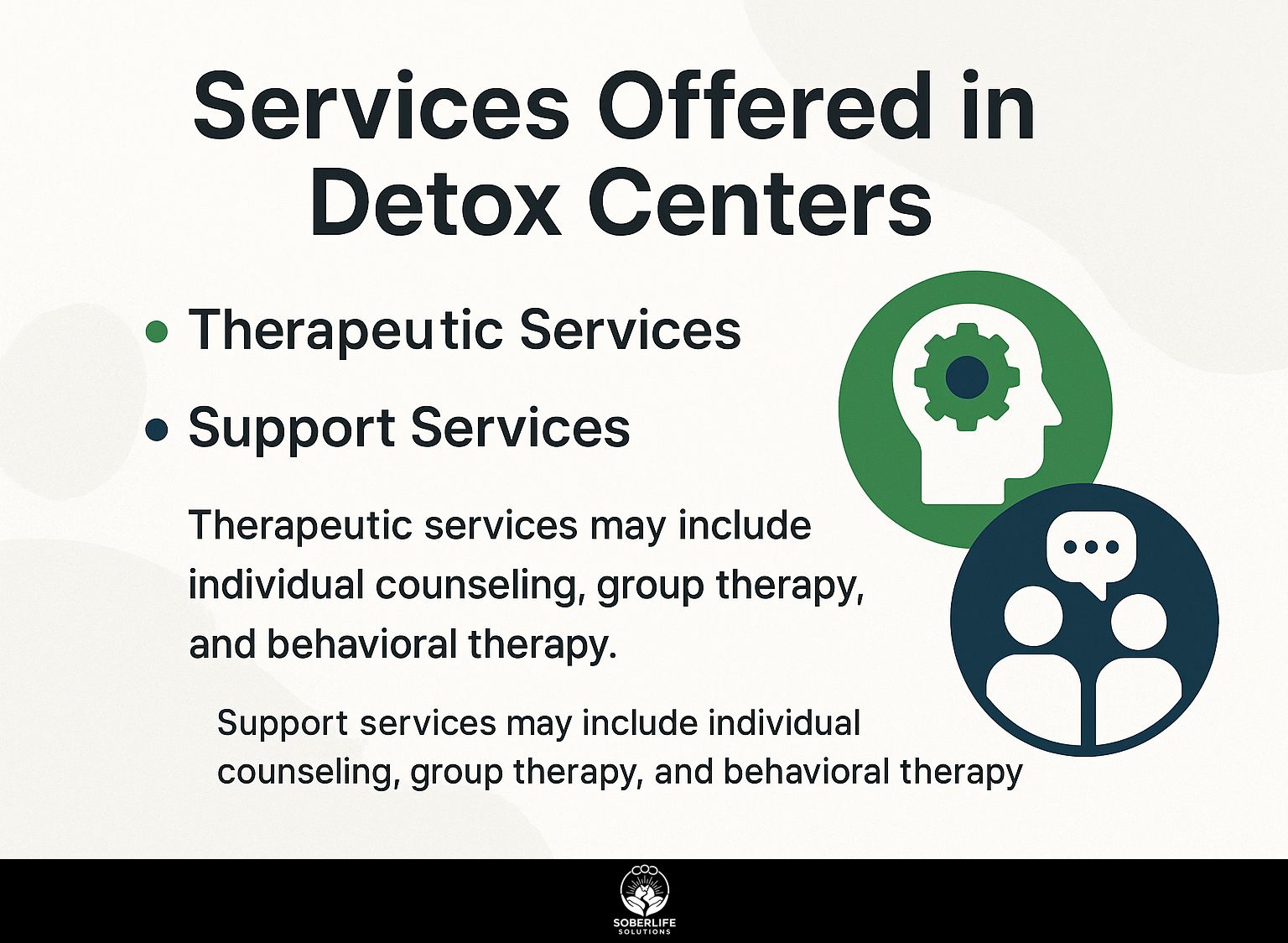
Detox centers provide different services to support patients as they recover, focusing on care and support. For an extensive analysis of this support system, our comprehensive study on peer support in detox centers highlights its essential role and impact on recovery.
Therapeutic Services
Detox centers offer therapeutic services such as personal counseling, group therapy, and family therapy sessions, which can greatly improve recovery results.
Each service is essential in the recovery process. Individual counseling offers a private setting where clients can talk about personal problems. Techniques like Cognitive Behavioral Therapy (CBT) are used to change negative ways of thinking.
Group therapy creates a feeling of togetherness and responsibility, letting participants talk about their experiences and ways to handle challenges. Family therapy helps family members learn about the relationships involved in addiction and uses methods from Dialectical Behavior Therapy (DBT) to make communication better.
These therapies collectively contribute to improved recovery rates, with studies showing up to a 60% increase in sustained sobriety among participants.
Support Services
Support services like aftercare planning and job training are important for helping people recover and return to society over the long term.
These services significantly improve outcomes, with studies indicating that aftercare can reduce relapse rates by up to 30%.
Essential components of aftercare include:
- Regular counseling sessions, which provide ongoing support;
- Peer mentorship programs, where individuals share experiences;
- Vocational training to improve job skills.
Using community resources like support groups and wellness workshops helps build a strong support system. Using these resources helps people stay strong and continue their recovery successfully.
Impact of Detox Center Management
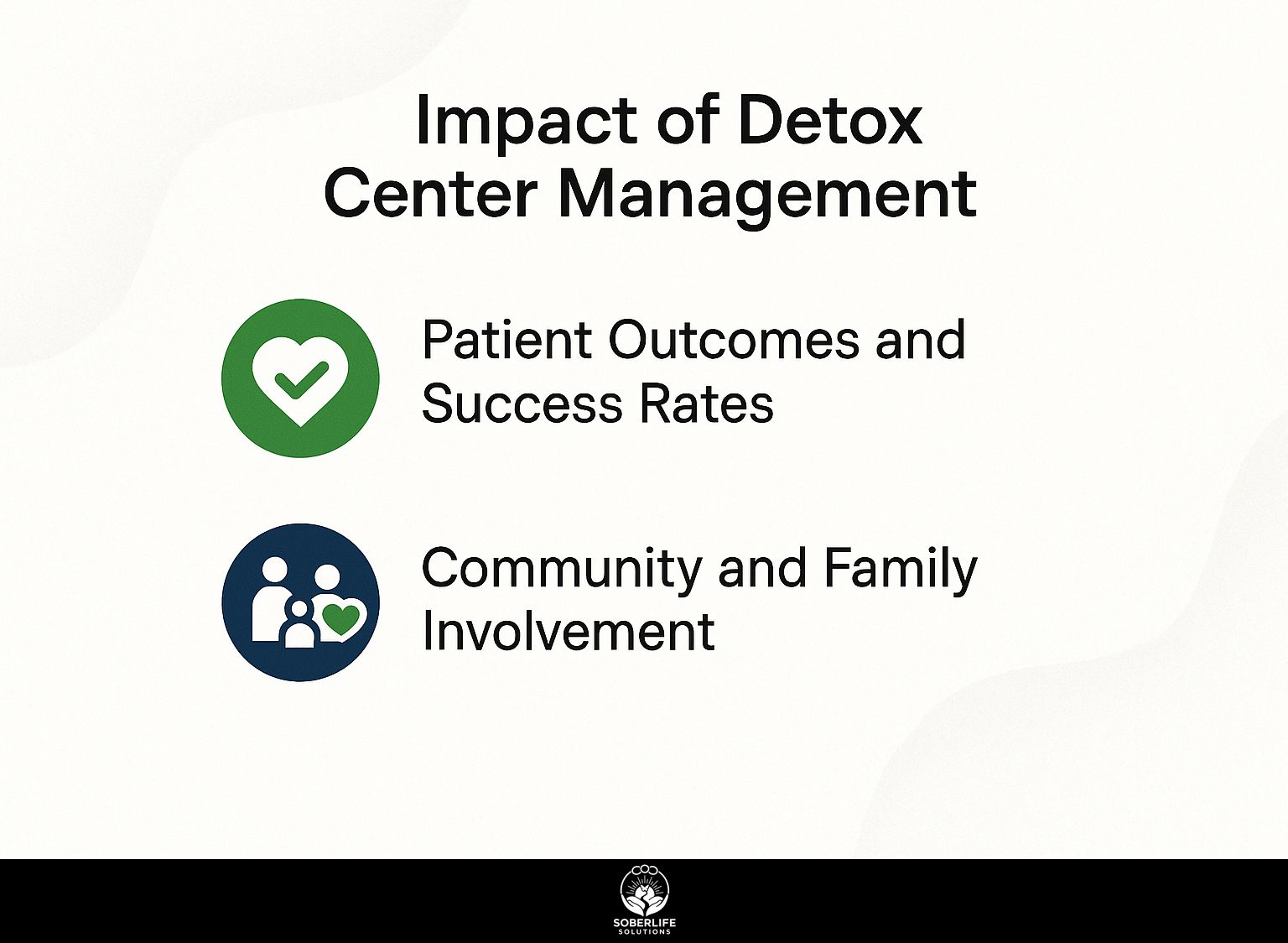
The ways detox centers are run strongly affect patient results, shaping both recovery success and how the community views them. For a deeper understanding of their role, particularly in addressing alcoholism, see our comprehensive overview of the role of detox centers in alcoholism recovery.
Patient Outcomes and Success Rates
Research indicates that structured management in detox centers can improve success rates by as much as 40%, directly correlating with follow-up care and support.
Setting up detailed follow-up programs is essential for maintaining recovery. For instance, the Robert Alexander Center has achieved an impressive 85% completion rate for its alumni aftercare initiatives, which include weekly support groups and one-on-one counseling sessions.
Tracking patient participation with tools like CareSmart can lead to better accountability and communication. By prioritizing these structured supports, detox centers can significantly increase the likelihood of long-term recovery, weaving a safety net that helps individuals transition back into daily life successfully.
Community and Family Involvement
When family and the community get involved in the detox process, it helps people recover by creating a supportive setting that is important for staying sober in the long run.
Programs like Al-Anon provide essential support groups for families of addicts, helping them learn coping strategies and connect with others facing similar challenges.
Local initiatives, such as community awareness events or workshops, also encourage dialogue about addiction.
For example, a successful project in a mid-sized city held monthly family support workshops that educated members about addiction and built strong connections among participants.
Including these families creates a sense of unity, allowing them to support their loved ones and tend to their own mental health.
Frequently Asked Questions
What is a detox center and what does it do?
A detox center is a facility designed to help individuals safely and effectively withdraw from substances such as drugs and alcohol. It provides a supportive and medically supervised environment for individuals to detoxify their bodies and regain control of their lives.
What types of medications are used in a detox center and how are they administered?
There are various types of medications that can be used in a detox center, depending on the specific needs of the individual. Some common medications include Suboxone, Methadone, and Naltrexone. These medications are typically administered orally or through injection, under the supervision of medical professionals.
What services are typically offered at a detox center?
In addition to medication management, detox centers often provide a range of services to support individuals through the detox process. These may include individual and group therapy, case management, nutritional support, and other resources to promote physical and emotional well-being.
How does detox center management impact an individual’s recovery process?
Effective detox center management can have a significant impact on an individual’s recovery process. With a well-structured and supportive environment, individuals can safely detox from substance use and begin to address the underlying psychological and emotional factors that contribute to addiction.
Are detox centers only for individuals struggling with drug or alcohol addiction?
No, detox centers are also available for individuals who are experiencing withdrawal symptoms from prescription medications, such as opioids or benzodiazepines. These medications can be highly addictive and require medical supervision to safely and comfortably detox from.
How does a detox center manage a client’s case during their stay?
A detox center team will work closely with each client to create an individualized treatment plan that addresses their specific needs and goals. They will regularly check the client’s progress and make changes as needed to get the best results for their detox and recovery.

